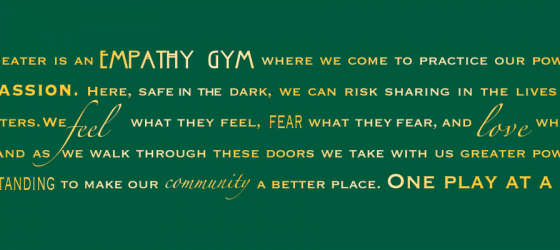In our January newsletter, we made six resolutions San Francisco Playhouse promises to keep this year. I thought it might be fun to go into a bit more depth on each one.
- To make our theatre a SAFE PLACE for all people (and animals)
- To LOOK DEEPLY at both sides of a conflict
- To EMPATHIZE even with those with whom we strongly disagree
- To have COMPASSION for all humans
- To promote understanding as the foundations of PEACE
- To say “YES!”
To be a safe place for all people
Most of us think of home as a safe place. But some people don’t associate home with safe. Some have fled home because of abuse, humiliation, manipulation, disrespect. Home is not always neutral.
We all know the feeling of going home for a holiday and feeling that we somehow are plugged into an unhealthy role we used to play. To be safe means to be heard. To be respected. As audience members, we need to know that we are valued for exactly who we are. That our point of view will not be ridiculed. Or scorned. Or marginalized. We will be welcomed with open arms no matter who we are. We want everyone one who walks through our doors to feel they are seen.
What does it mean for an artist to feel safe? It is similar, I think, but goes farther. To create a safe place for artists is extremely difficult because we do have to impart criticism. How can we give notes that tell the artist they need to improve and at the same time make they feel safe?
Actors need to be naked, to let us see inside them, to reveal every vulnerability, fear, longing, feelings of being lost, lonely, inadequate. And yet at the same time, the director has to suggest changes, has to gently push actors in a different direction from their first instinct. We dedicate ourselves to walking that tightrope every day, creating a safe place for artists to bare their souls.
To look deeply at both sides of a conflict
Who is right? Who is wrong? We will try our best not to take sides. We want to understand the forces that are at work on both sides of a conflict. We are more interested in finding an insight into our adversary than in winning the debate.
In the world of politics, we fight for our beliefs, we plead eloquently for our cause, but in the theatre, we are here to learn why someone takes an action we may abhor. What is truth? In the great Japanese play, Rashomon, a detective struggles throughout the drama with three very compelling versions of who committed a murder. Yet despite his maniacal dedication to search for the truth, in the end he cannot prove which theory is correct and the case must be dismissed.
Pirandello, the great Italian playwright who was the first to win a Nobel prize, played often with the same themes. We humans are inclined by our religious and ideological trainings and even by science to believe things are either true or false, right or wrong. But the theatre is not really interested in a verdict. We are interested in looking at the unbearable complexity of truth, the agonizing struggle we humans face when making decisions.
To empathize with those with whom we strongly disagree
In The Merchant of Venice and Othello, we are appalled by Iago or Shylock’s actions. And yet, he would not be Shakespeare if he did not open a door to both of these bitter hearts to let us see the pain inside. We see how revenge can blossom in the heart of someone who is wronged and lives in pain.
Two thousand years ago, Aristotle defined the feeling we get when a good man goes down to tragedy. He called it “fear and pity.” We fear that we could succumb to the same overwhelming emotions as the tragic protagonist. We are terrified the same thing could happen to us. We say, “No, no, don’t do it!,” and when Oedipus, or Willy Loman, or Medea, or Macbeth does succumb, we cry, “No, no, no!” and we pity and weep for them.”
To me, nothing about great theatre has changed since Aristotle’s time. The purpose of theatre is to generate that “fear and pity” in the men and woman who think we may be making a terrible choice. We see that every day in our lives. Theatre is the place we can look our enemy in the eye and identify with him.
To have compassion for all humans
Our public entertainment, television, film, are full of cardboard villains that popular culture uses to give us someone to hate. For years, we have been given one-dimensional characters that represent Germans, Japanese, Russians, radical Muslims, Klingons, the LA Dodgers.
It’s natural for humans to be victimized by polarized thinking. It somehow makes life easier for many of us if we can have things spelled out. A classic example are cowboy movies where the characters wear black or white hats to indicate their level of goodness or villainy. Our theatre is an antidote to that human frailty. We believe every human is deserving of our compassion. It is a difficult vow to keep. In our lives, we do need to make choices about where we put our allegiance. But when we walk through the doors of the empathy gym, we take off our black or white hats and open our hearts to all.
To Promote Understanding as the Foundation of Peace
I like to say at the end of my “empathy gym” spiel that “we take the unity we build in the theatre out into the streets to make our world a better place, one play at a time.” Call it a religion, call it an ideology, call it a doctrine, that is why the theatre exists. To promote understanding.
Like many a career teacher, it is rare when we can see the actual impact of our work on lives. Every so often, someone will tell me on their way out of the theatre that we changed their point of view based on their experience in the theatre, that a play opened their hearts to understand a kind of person or behavior they had previous closed their hearts to. We believe that we are here to promote deeper levels of understanding in the world. Understanding that melts judgement and hatred, understanding that builds brother and sisterhood, understanding that leads to peace.
To say “Yes!”
The world is full of Nos, Nevers, and Nots. We hope and dedicate ourselves in our theatre to promoting Yes for our organization, employees, artists and patrons. Yes lifts us up. Yes builds trust and safety. Yes makes us feel heard and respected. Yes pulls us forward into the heart of things. Yes promotes awe and curiosity, innovation and discovery. Just saying the word Yes over and over promotes joy.
Please write me at [email protected] to share any thoughts you may have.
– Bill English (Artistic Director)
Wera V. W.
Latest posts by Wera V. W. (see all)
- 3 Tall Persian Women by Anita Abdinezhad – Zoomlet - March 2022
- UPSTREAM / DOWNSTREAM by Sam Hamashima – Zoomlet - February 2022
- Ghosts by Henrik Ibsen – Zoomlet - February 2022



